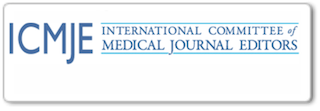The Relationship between Anxiety, Depression, and Vital Signs among Postpartum Mothers in Yogyakarta
Abstract
After labor, mothers need good physiological and psychological adjustments. The inability to adapt to a new situation can result in mothers' psychological stress, eventually leading to postpartum crises and depression. If this incident is not handled, it can lead to serious mental health problems, especially postpartum psychosis to bipolar disorder. In depressed and anxious people, the body will secrete adrenal hormones, which cause vital signs such as blood pressure, body temperature, respiration, and pulse. This study aims to find the relationship between anxiety, depression, and vital signs of postpartum mothers. This study used qualitative with correlation cross-sectional design. The respondents were 60 postpartum mothers at 0-6 months postpartum in Yogyakarta recruited using purposive sampling techniques. The instrument used to measure postpartum maternal depression was The Back Depression Inventory version II and State Anxiety Inventory (STAI) to measure anxiety. Data analysis used Pearson to find the relationship between anxiety, depression, and vital signs. The t-test analysis shows there were relationship between state and trait anxiety with a pulse (p-value = 0.00), respiration (p-value = 0.00), depression with a pulse (the p-value = 0.00) and respiration (p-value 0.00). Anxiety and depression can be detected from the changes in the vital signs of postpartum mothers so that early detection by health workers can prevent anxiety and depression
Keywords
References
Abdollahi, F., & Zarghami, M. (2018). Effect of postpartum depression on women’s mental and physical health four years after childbirth. Eastern Mediterranean Health Journal, 24(10), 1002–1009.
Ardiyanti, D., & Dinni, S. M. (2018). Aplikasi Model Rasch dalam Pengembangan Instrumen Deteksi Dini Postpartum Depression. 45(2), 81–97.
Arini, F. N., Adriatmoko, W., Novita, M., Mulut, B., Gigi, F. K., Jember, U., Forensik, O., Gigi, F. K., & Jember, U. (2017). Perubahan Tanda Vital sebagai Gejala Rasa Cemas sebelum Melakukan Tindakan Pencabutan Gigi pada Mahasiswa Profesi Klinik Bedah Mulut RSGM Universitas Jember (The Alteration of Vital Sign as Students’ Anxiety Symptoms before Performing Tooth Extraction in. Pustaka Kesehatan, 5(2), 323-330.
Bauman, B. L., Ko, J. Y., Cox, S., D’Angelo Mph, D. V., Warner, L., Folger, S., Tevendale, H. D., Coy, K. C., Harrison, L., & Barfield, W. D. (2020). Vital Signs: Postpartum Depressive Symptoms and Provider Discussions About Perinatal Depression- United States, 2018. MMWR. Morbidity and Mortality Weekly Report, 69(19), 575–581.
Dibaji, S. M., Reza Oreyzi, S. H., & Abedi, M. R. (2017). Occupation or Home: Comparison Housewives and Working Women in the Variables of Stress, Depression and Perception of Quantitative, Mental and Emotional Home Demands. Review of European Studies, 9(2), 268-274.
Ernawati, D., Merlin, W. O., & Ismarwati, I. (2020). Kejadian Postpartum Blues pada Ibu Postpartum di RS PKU Muhammadiyah Yogyakarta. Jurnal Ners Dan Kebidanan (Journal of Ners and Midwifery), 7(2), 203–212.
Hahn-holbrook, J. (2018). Economic and Health Predictors of National Postpartum Depression Prevalence: A Systematic Review, Meta-analysis, and Meta-Regression of 291 Studies from 56 Countries. Frontiers in psychiatry, 8, 1-23.
Kuo, S. Y., Tsai, S. H., Chen, S. L., & Tzeng, Y. L. (2016). Auricular acupressure relieves anxiety and fatigue, and reduces cortisol levels in post-caesarean section women: A single-blind, randomised controlled study. International Journal of Nursing Studies, 53, 17–26.
Kusuma, P. D. (2017). Karakteristik Penyebab Terjadinya Depresi Postpartum. Jurnal Keperawatan Notokusumo, V(1), 36–45.
Mulya, A. P., Ropi, H., & Yani, D. I. (2019). Relationship between Family Anxiety, Family Support and Quality of Life of Attention Defcit Hiperactivity Disorder (Adhd) Children. Jurnal Keperawatan Padjadjaran, 7(2), 164–172.
Nasri, Z., Wibowo, A., & Ghozali, E. W. (2017). Faktor determinan depresi postpartum di kabupaten lombok timur Determinants Factors of Postpartum Depression in East Lombok. Biuletin Penelitian Sistem Kesehatan, 20(3), 89–95.
Natalia, R., & Rustina, Y. (2020). Pengaruh Dukungan Keluarga dan Teman Sebaya terhadap Ibu Menyusui Neonatus di Rumah Sakit: Telaah Literatur. Jurnal Pendidikan Keperawatan Indonesia, 6(1), 93–103.
Pawluski, J. L., Lonstein, J. S., & Fleming, A. S. (2017). The Neurobiology of Postpartum Anxiety and Depression. Trends in Neurosciences, 40(2), 106–120.
Permana, B., Lindayani, L., Hendra, A., & Juniarni, L. (2020). the Effect of Yoga Execrcise on Reducing Blood Pressure Among Elderly With Hypertention: a Systematic Review. Jurnal Pendidikan Keperawatan Indonesia, 6(2), 163–170.
VanderKruik, R., Barreix, M., Chou, D., Allen, T., Say, L., Cohen, L. S., Barbour, K., Cecatti, J. G., Cottler, S., Fawole, O., Firoz, T., Gadama, L., Ghérissi, A., Gyte, G., Hindin, M., Jayathilaka, A., Kalamar, A., Kone, Y., Lange, I., … von Dadelszen, P. (2017). The global prevalence of postpartum psychosis: A systematic review. BMC Psychiatry, 17(1), 1–9.
Wahyuni, S., & Putri Parendrawati, D. (2013). Pengalaman Ibu dalam Melakukan Perawatan Metode Kanguru. Jurnal Keperawatan Padjadjaran. 1-10.
Wibisono, A. (2018). Hubungan karakteristik personal dengan kecemasan pada ibu postpartum di wilayah kerja puskesmas gatak sukoharjo. Mathematics Education Journal, 1(1), 75-85.
Yosianty, E., & Darmawati, I. (2019). Pengetahuan Ibu Berhubungan dengan Kepatuhan Pemberian Imunisasi Campak. Jurnal Keperawatan BSI, 7(1), 92-99.
DOI: https://doi.org/10.17509/jpki.v7i1.31527
Refbacks
- There are currently no refbacks.
Jurnal Pendidikan Keperawatan Indonesia(JPKI) published by Indonesia University of Education. JPKI is licensed under a Creative Commons Attribution-ShareAlike 4.0 International License.
Office :
Nursing Department. FPOK UPI.
229, Dr. Setiabudhi Street. Bandung 40154
West Java , Indonesia
E-mail : jpki@upi.edu

_.png)
_.png)
_.png)











